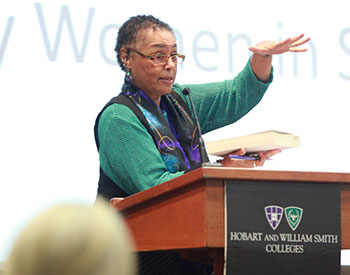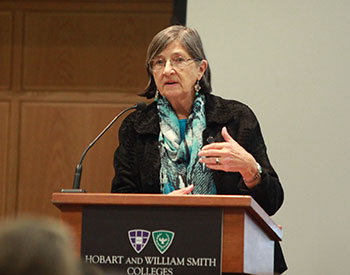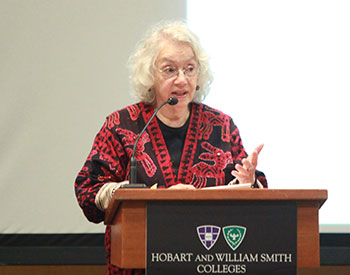Hands on the Freedom Plow:the Women of SNCC

Film producer and former Student Nonviolent Coordinating Committee (SNCC) activist Judy Richardson was grew up in Tarrytown, N.Y. She attended Swarthmore College on a full, four-year scholarship, and later attended Columbia University, Howard University, and Antioch College.
Richardson joined the Swarthmore Political Action Committee (SPAC), a Students for a Democratic Society affiliate, before joining the SNCC. She has worked closely with civil rights activists Gloria Richardson, Reggie Robinson, James Forman, Ruby Doris Smith-Robinson, and Julian Bond, among others. In 1965, Richardson became office manager for Julian Bond’s successful first campaign for the Georgia House of Representatives; she also organized a northern Freedom School to bring together young activists from SNCC’s Southern projects and Northern support offices.
In 1968, Richardson and other former SNCC staffers founded Drum and Spear Bookstore in Washington, D.C., which became the largest black bookstore in the country. Richardson served as the children’s editor of Drum and Spear Press, and wrote an essay on racism in black children’s books, which was published by Howard University’s Journal of Negro Education.
In 1978, Richardson began working with Henry Hampton and Blackside Productions on an early version of what would become the Eyes On The Prize series. Production for the Academy Award-nominated, six-hour PBS series began in 1986, during which time she acted as researcher and content advisor. For Eyes On The Prize II, the subsequent eight-hour series, Richardson served as associate producer.
Beginning in 1982, Richardson was director of information for the United Church of Christ Commission for Racial Justice, participating in its protests against police brutality in New York City, and its bus caravans to the Alabama Black Belt to counter the Reagan Administration’s intimidation of elderly African American voters. Richardson later co-produced Blackside’s 1994 Emmy and Peabody Award-winning documentary, Malcolm X: Make It Plain (for PBS’s The American Experience).
As a senior producer for Northern Light Productions in Boston, Richardson has produced historical documentaries for broadcast and museums, with a focus on African American historical events, including a one-hour documentary on the 1968 Orangeburg Massacre(S.C.) for PBS, two History Channel documentaries on slavery and slave resistance, and installations for, among others, the National Park Service’s Little Rock Nine Visitor’s Center, the National Underground Railroad Freedom Center (Cincinnati), the New York State Historical Society’s “Slavery in New York” exhibit, and the Paul Laurence Dunbar House (Dayton).
Richardson and five other SNCC women, edited Hands on the Freedom Plow: Personal Accounts By Women in SNCC. The anthology, published by University of Illinois Press, includes the courageous stories of over fifty SNCC women. It was the Press’ best-selling title in 2011 and was issued in paperback in August 2012. Richardson received an Image Award for Vision and Excellence from Women in Film and Video. She lectures, writes, and conducts professional development workshops for teachers about the history and values of the Civil Rights Movement and their relevance to current issues. Richardson was awarded an honorary doctorate by Swarthmore College and became a visiting professor at Brown University in the fall of 2012.

Betty Garman Robinson grew up in Pleasantville, N.Y., and is a long time community organizer. While attending Skidmore College, she became involved with the National Student Association (NSA), an organization of student body leaders, before joining Students for a Democratic Society (SDS).
Robinson attended graduate school at UC Berkeley, and continued to be involved with SDS. After hearing stories about escalating tensions in the South, she formed an organization in Berkeley to support the Southern Movement, and as a result came in contact with Student Nonviolent Coordinating Committee (SNCC) organizer Jim Forman and SNCC staff member Casey Hayden. Robinson then attended the November 1963 SNCC Conference at Howard University, and joined the SNCC the following spring. She worked with the SNCC from 1964-66 as a member of the SNCC staff in both Mississippi and the national office in Atlanta, Georgia.
In the 1970’s Robinson moved to Baltimore to do factory and union organizing, which led her to a career in public health. She started with occupational health research and ended as the director of an HIV/AIDS study clinic. In 1997 she returned to community organizing as the Lead Organizer for Citizens Planning and Housing Association (CPHA). In 2003, Robinson was awarded an Open Society Institute Community Fellowship to connect Baltimore organizers across issues and constituencies and to popularize the history of organizing in Baltimore. She is a strong supporter of grassroots organizing groups in Baltimore, working closely with the Baltimore Algebra Project, the United Workers and is co-facilitator of the Ella Baker Grassroots Organizing Learning Circle.
Robinson is a co-editor of the book, Hands on the Freedom Plow: Personal Accounts of Women in SNCC, published in 2010 by the University of Illinois Press.

Activist Dorothy M. Zellner was a staff member of the Student Nonviolent Coordinating Committee (SNCC) from 1962 to 1967 and spent Freedom Summer, 1964, in Greenwood, Mississippi. After twenty years in the South, she returned to New York and worked for the Center for Constitutional Rights and the City University of New York Law School. She has appeared in many books and television programs and was featured in TNT’s “Century of Women.” Zellner is currently a consultant in New York City. She is also a member of Jews Say No.
Zellner is a co-editor of the book, Hands on the Freedom Plow: Personal Accounts of Women in SNCC, published in 2010 by the University of Illinois Press.
This information is accurate for the time period that this person(s) spoke at Hobart and William Smith.
